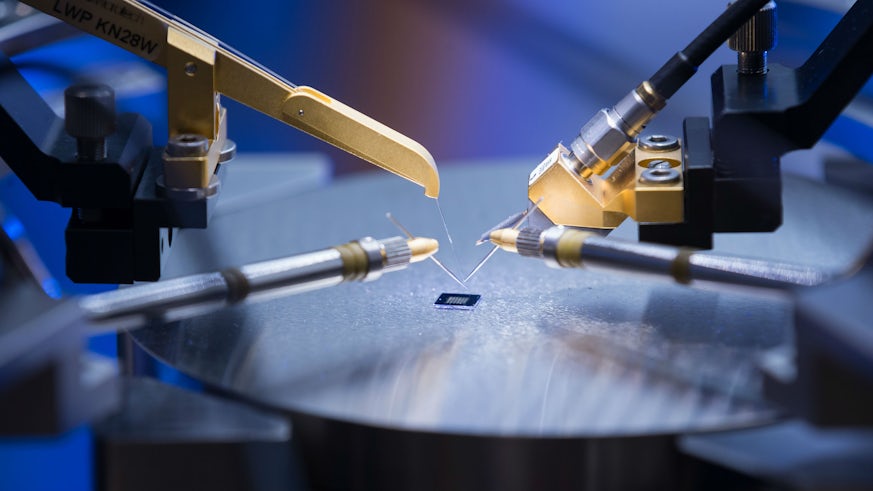EPSRC funds CS Centre for Doctoral Training
4 February 2019

A new Centre for Doctoral Training (CDT) will help train tomorrow’s experts in Compound Semiconductor technologies.
The Cardiff University-led CDT in Compound Semiconductor Manufacturing will provide outstanding PhD-level training aligned with the needs of UK industry.
It is one of 75 CDTs announced today by the Engineering and Physical Sciences Research Council (EPSRC) as part of a £446m investment in skills by UK Research and Innovation (UKRI).
Co-created with IQE Plc, Compound Semiconductor Centre, Newport Wafer Fab and the Compound Semiconductor Applications (CSA) Catapult, the CDT is an alliance of four universities (Cardiff, UCL, Sheffield and Manchester) and 24 companies, many already working closely together via the EPSRC Future CS Manufacturing Hub, based at Cardiff University.
With established excellence in CS disciplines, the CDT will provide distinctive PhD training that is industrially relevant and intellectually challenging.
Professor Peter Smowton, Director of the Institute for Compound Semiconductors, said: “Our vision is of PhD graduates equipped with the necessary skills to accelerate their own career trajectory, satisfy their personal ambitions and change the face of UK CS Manufacturing.
“This will radically boost the uptake of CS technology in applications through the ability to apply the manufacturing approaches of Silicon to CS. It will help UK companies along the supply chain exploit the electronic, magnetic, optical and power-handling properties of CS, allowing companies to pioneer novel integrated functionalities such as sensing, data processing and communication.

We will supply the UK with scientists and engineers with relevant skills, and knowledge of the ecosystem of the entire supply chain, for industrial exploitation of CSs. This benefits not only the manufacturing of materials and devices but also the systems and applications that utilise them.
UKRI is funding 75 CDTs to equip the UK with the next generation of doctoral level researchers it needs across the breadth of the engineering and physical sciences landscape.
UKRI’s Chief Executive, Professor Sir Mark Walport said: “Highly talented people are required to tackle key global challenges such as sustainable energy and cyber security, and provide leadership across industries and our public services.
“Centres for Doctoral Training provide them with the support, tools and training they need to succeed, and the involvement of 1,400 project partners underlines how much industry and the charity sector value this approach.”
Professor Kim Graham, Pro Vice-Chancellor, Research, Innovation and Enterprise, said: “Our research on compound semiconductors is world-leading, and I am delighted with Professor Smowton’s successful application for an EPSRC Centre for Doctoral Training in Compound Semiconductor Manufacturing. This welcome investment from the EPSRC ensures that we can support the education and career development of the next generation of leaders in this major research priority for the University.
“We have invested significant resources in compound semiconductor research over the past 5 years, including the appointment of 10 new academic members of staff. For this particular EPSRC Centre for Doctoral Training, the University has pledged to contribute over £1.5M in estates, staff and additional studentship costs. This highlights Cardiff University’s commitment to providing our extended community of scholars, industry partners and postgraduate researchers with state-of-the-art facilities and the necessary support to accelerate research and technological innovation in this rapidly developing field.”
EPSRC has supported over 50,000 doctoral students over the last 25 years: 43% of EPSRC invested students go on to be employed in business/public services while 36% go on to work in academia.
Cardiff will also play a major role in a second Centre for Doctoral Training, working in partnership with the universities of Nottingham and Sheffield to establish an EPSRC CDT in Resilient Decarbonised Fuel Energy Systems through FLEXIS. The Cardiff base will be located at the Gas Turbine Research Centre in Port Talbot.
The collaboration will carry out research in energy-intensive applications over the next eight years, and will investigate the re-purposing and re-use of existing energy infrastructure to deliver rapid and cost-effective decarbonisation across four themes, including decreasing CO2 emissions from industrial processes through Carbon Capture and repurposing existing processes to generate energy and co-products from low-carbon biomass and waste fuels.
FLEXIS is a £24m research operation, part-funded by the European Regional Development Fund via the Welsh Government, which aims to achieve a resilient, affordable and secure energy system across Wales with the potential for global application.
Share this story
The institute provides cutting-edge facilities to help researchers and industry work together.



